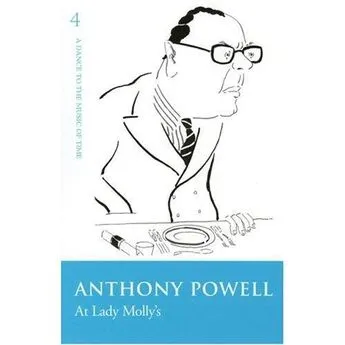Anthony Powell - At Lady Mollys
- Название:At Lady Mollys
- Автор:
- Жанр:
- Издательство:неизвестно
- Год:2005
- ISBN:нет данных
- Рейтинг:
- Избранное:Добавить в избранное
-
Отзывы:
-
Ваша оценка:
Anthony Powell - At Lady Mollys краткое содержание
A Dance to the Music of Time — his brilliant 12-novel sequence, which chronicles the lives of over three hundred characters, is a unique evocation of life in twentieth-century England.
The novels follow Nicholas Jenkins, Kenneth Widmerpool and others, as they negotiate the intellectual, cultural and social hurdles that stand between them and the “Acceptance World.”
At Lady Mollys - читать онлайн бесплатно полную версию (весь текст целиком)
Интервал:
Закладка:
‘C’est incontestable, cher ami, Hitler a renonce a son intention d’engouffrer l’Autriche par une agression directe.’
‘A mon avis — et d’ailleurs je l’ai toujours dit — la France avait tort de s’opposer a I’union douaniere en ’31.’
The fat man had moved on to steak-and-kidney pudding, leeks and mashed potato, with a green salad. Widmerpool cleared his throat. Something was on his mind. He began in a sudden burst of words.
‘I had a special reason for inviting you to lunch today, Nicholas. I wanted to speak of my engagement. But it is not easy for me to explain in so many words what I desire to say.’
He spoke sententiously, breaking off abruptly. I had an uneasy feeling, unlikely as this would be, that he might be about to ask me to act as best man at his wedding. I began to think of excuses to avoid such a duty. However, it turned out he had no such intention. It seemed likely, on second thoughts, that he wanted to discuss seriously some matter regarding himself which he feared might, on ventilation, cause amusement. Certainly I found it difficult to take his engagement seriously. There is, for some reason, scarcely, any subject more difficult to treat with gravity if you are not yourself involved. Obviously two people were contemplating a step which would affect their future lives in the most powerful manner; and yet the outward appearance of the two of them, and Widmerpool’s own self-sufficiency, made it impossible to consider the matter without inner amusement.
‘Years ago I told you I was in love with Barbara Goring,’ said Widmerpool slowly.
‘I remember.’
‘Barbara is a thing of the past. I want her entirely forgotten.’
‘Why not? I shan’t stand up at your wedding and say: “This ceremony cannot continue — the bridegroom once loved another!”.’
‘Quite so, quite so,’ said Widmerpool, grunting out a laugh. ‘You are absolutely right to make a joke of it. At the same time, I thought I should mention my feelings on that subject. One cannot be too careful.’
‘And I presume you want Gipsy Jones forgotten too?’
Widmerpool flushed.
‘Yes,’ he said. ‘She too, of course.’
His complacency seemed to me at that time intolerable. Now, I can see he required only to discuss his own situation with someone he had known for a long period, who was at the same time not too closely associated with his current life. For that role I was peculiarly eligible. More than once before, he had told me of his emotional upheavals — it was only because of that I knew so much about Barbara Goring and Gipsy Jones — and, when a confessor has been chosen, the habit is hard to break. At the same time, his innate suspicion of everyone inhibited even his taste for talking about himself.
‘Mildred is, of course, rather older than I,’ he said.
I felt in some manner imprisoned by his own self-preoccupation. He positively forced one to agree that his own affairs were intensly important: indeed, the only existing question of any real interest. At the same time his intense egoism somehow dried up all sympathy for him. Clearly there was much about his present circumstances that made him nervous. That was, after all, natural enough for anyone contemplating marriage. Yet there seemed more here than the traditionally highly-strung state of a man who has only lately proposed and been accepted. I remembered that he had never asked Barbara Goring to marry him, because in those days he was not rich enough to marry. He read my thoughts, as people do when their intuition is sharpened by intensity of interest excited by discussing themselves.
‘She was left with a bit of money by Haycock,’ he said. ‘Though her financial affairs are in an appalling mess.’
‘I see.’
‘How long have you known Lady Molly?’
‘That was the first night I had been there.’
‘I wish I had known her in the great days,’ he said. ‘I cannot say that I greatly care for the atmosphere of her present home.’
‘You would prefer Dogdene?’
‘I believe that in many ways Dogdene was far from ideally run either,’ said Widmerpool curtly. ‘But at least it provided a suitable background for a grande dame. Mildred is a friend of the present Lady Sleaford, so that I dare say in due course I shall be able to judge how Lady Molly must have looked there.’
This manner of describing Molly Jeavons somehow affronted me, not so much from disagreement, or on account of its pretentious sound, but because I had not myself given Widmerpool credit for thus estimating her qualities, even in his own crude terms. I was, indeed, surprised that he did not dismiss her as a failure, noting at the same time his certainty of invitation to Dogdene. From what Chips Lovell used to say on that subject, I was not sure that Widmerpool might not be counting his chickens before they were hatched.
‘It is because of Dogdene, as you know yourself, that Mildred is such an old friend of Lady Molly’s. Perhaps not a very close friend, but they have known each other a long time.’
‘Yes?’
I could not guess what he was getting at.
‘In fact we first met at Lady Molly’s.’
‘I see.’
‘Mildred is — how shall I put it — a woman of the world like Lady Molly — but — well — hardly with Lady Molly’s easy-going manner of looking at things — I don’t mean that exactly — in some ways Mildred is very easy-going — but she likes her own way — and — in her own manner — takes life rather seriously—’
He suddenly began to look wretched, much as I had often seen him look as a schoolboy: lonely: awkward: unpopular: odd; no longer the self-confident business-man into which he had grown. His face now brought back the days when one used to watch him plodding off through the drizzle to undertake the long, solitary runs across the dismal fields beyond the sewage farms: runs which were to train him for teams in which he was never included. His jaws ceased to move up and down. He drank off a second glass of water.
‘Anyway, you know General and Mrs. Conyers,’ he said.
He added this rather lamely, as if he lacked strength of mind to pursue the subject upon which he hoped to embark.
‘I am going to tea with them this afternoon as it happens.’
‘Why on earth are you doing that?’
‘I haven’t seen them for a long time. We’ve known them for ages, as I told you.’
‘Oh, well, yes, I see.’
He seemed disturbed by the information. I wondered whether Mrs. Conyers had already shown herself ‘against’ the marriage. Certainly she had been worried about her sister at the Jeavons house. I had supposed the sight of Widmerpool himself to have set her worst fears at rest. Even if prepared on the whole to accept him, she may have let fall some remark that evening unintentionally wounding to his self-esteem. He was immensely touchy. However, his present uneasiness appeared to be chiefly vested in his own ignorance of how much I already knew about his future wife. evidently he could not make up his mind upon this last matter. The uncertainty irked him.
‘Then you must have heard all about Mildred?’ he persisted.
‘No, not much. I only know about Mrs. Conyers, so to speak. And I have often been told stories about their father, of course. I know hardly anything about the other sisters. Mrs. Haycock was married to an Australian, wasn’t she? I knew she had two husbands, both dead.’
‘Only that?’
Widmerpool paused, disappointed by my ignorance, or additionally suspicious; perhaps both. He may have decided that for his purposes I knew at once too much and too litde.
‘You realise,’ he said slowly, ‘that Mildred has been used to a lot of her own way — her own way of life, that is. Haycock left her — in fact even encouraged her — so it seems to me — to lead — well — a rather — rather independent sort of life. They were — as one might say — a very modern married couple.’
‘Beyond the fact that they lived on the Riviera, I know scarcely anything about them.’
‘Haycock had worked very hard all his life. He wanted some relaxation in his later days. That was understandable. They got on quite well so far as I can see.’
I began to apprehend a little of what Widmerpool was hinting. Mrs. Haycock’s outline became clearer. No doubt she had graduated from an earlier emancipation of slang and cigarettes, to a habit of life with threatening aspects for a future husband.
‘Did they have any children?’
‘Yes,’ said Widmerpool. ‘They did. Mildred has two children. That does not worry me. Not at all. Glad to start with a family.’
He said all this so aggressively that I suspected a touch of bravado. Then he paused. I was about to ask the age and sex of the children, when he began to speak hurriedly again, the words tumbling out as if he wanted to finish with this speech as quickly as possible.
‘I should not wish to appear backward in display of affection,’ he said, developing an increased speed with every phrase, ‘and, in addition to that, I don’t see why we should delay unduly the state in which we shall spend the rest of our life merely because certain legal and religious formalities take time to arrange. In short, Nicholas, you will, I am sure, agree — more especially as you seem to spend a good deal of your time with artists and film-writers and people of that sort, whose morals are proverbial — that it would be permissible on my part to suppose — once the day of the wedding has been fixed — that we might — occasionally enjoy each other’s company — say, over a week-end—’
He came to a sudden stop, looking at me rather wildly.
‘I don’t see why not.’
It was impossible to guess what he was going to say next. This was all far from anything for which I had been prepared.
‘In fact my fiancee — Mildred, that is — might even expect such a suggestion?’
‘Well, yes, from what you say.’
‘Might even regard it as usage du monde ?’
‘Quite possible.’
Then Widmerpool sniggered. For some reason I was conscious of embarrassment, even of annoyance. The problem could be treated, as it were, clinically, or humorously; a combination of the two approaches was distasteful. I had the impression that the question of how he should behave worried him more on account of the figure he cut in the eyes of Mrs. Haycock than because his passion could not be curbed. However, to have released from his mind these observations had clearly been a great relief to him. Now he cheered up a little.
‘There is a further point,’ he said. ‘As my name is an uncommon one, I take it I should be called upon to provide myself with a sobriquet.’
‘I suppose so.’
‘In your own case, the difficulty would scarcely arise — so many people being called “Jenkins”.’
‘It may surprise you to hear that when I embark on clandestine week-ends, I call myself “Widmerpool”.’
Widmerpool laughed with reasonable heartiness at that fancy. All the same, the question of what name should cover the identity of Mrs. Haycock and himself when first appearing as husband and wife still worried him.
‘But what surname do you think should be employed?’ he asked in a reflective tone, speaking almost to himself.
‘“Mr. and Mrs. Smith” would have the merit of such absolute banality that it would almost draw attention to yourselves. Besides, you might be mistaken for the Jeavonses’ borrowed butler.’
Widmerpool, still pondering, ignored this facetiousness, regarding me with unseeing eyes.
‘“Mr. and the Honourable Mrs. Smith?” You might feel that more in keeping with your future wife’s rank and station. That, in any case, would strike a certain note of originality in the circumstances.’
Читать дальшеИнтервал:
Закладка:








